Levelling Up Impact Report



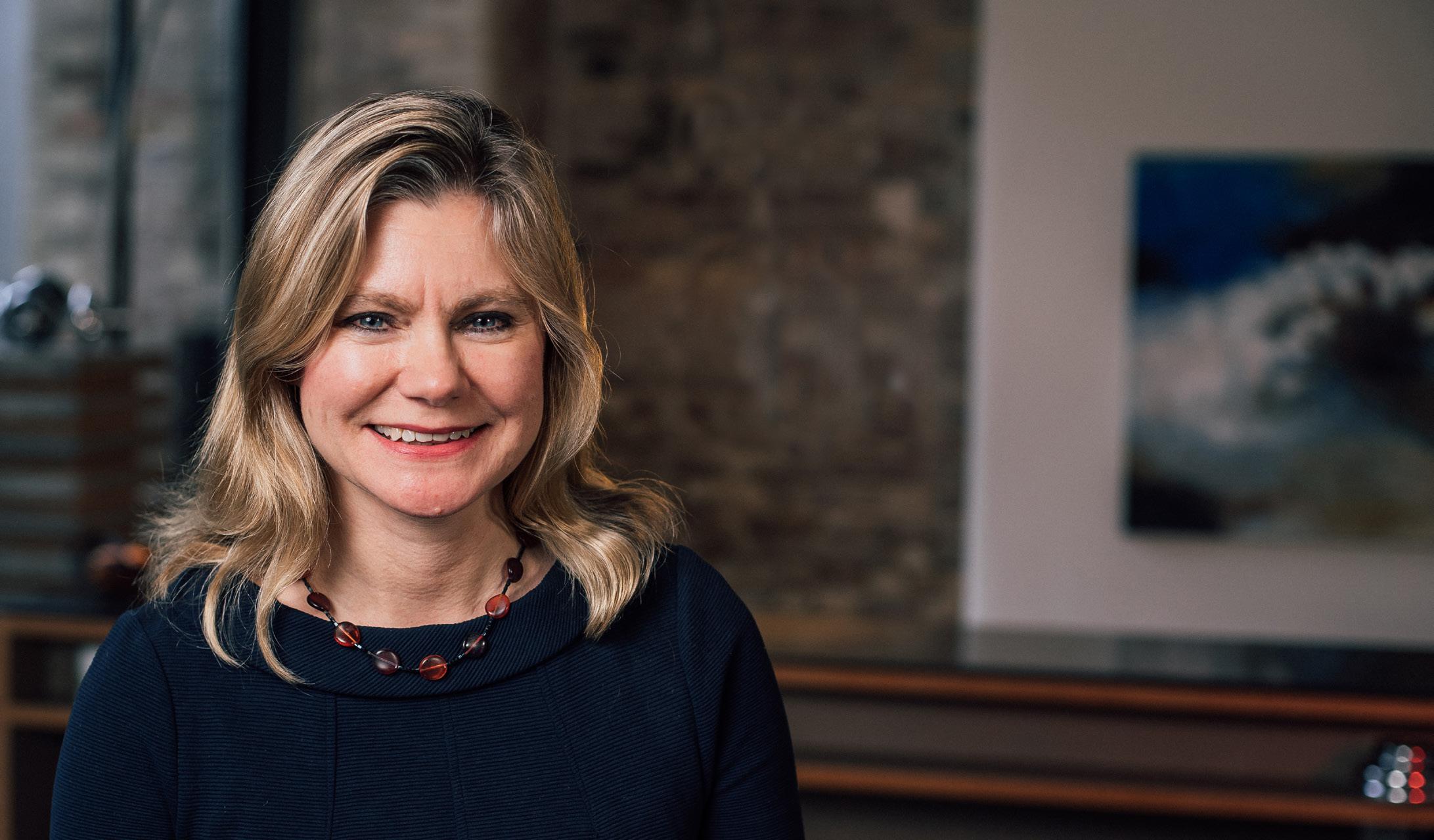
Centrica has a rich history of providing energy and services to people across the United Kingdom with a host of trusted brands such as British Gas under its umbrella.
Its 7,000 plus engineers and technicians work hard to make sure that customer needs are met, and are a vital and valuable part of the vast and efficient company.
As such, Centrica has made it clear that their mental and physical health must be prioritised and they are given the flexibility to work comfortably, freedom to grow, and knowledge to succeed.
This colleague focused approach is evident in this independent impact report which examines the steps it has taken on meeting the 14 Purpose Goals.
The goals, which were created with the Purpose Coalition - a group of purpose-led organisations - create a common design with which organisations can measure their progress.
This allows them to generate benchmarks, target their social impact more effectively, and collaborate through the sharing of best practice.
In this report, Centrica has demonstrated how it is meeting five goals in particular.
They are: Goal 3 - Positive Destinations Post 16, Goal 5 - Open recruitment, Goal 8 - Good health and wellbeing, Goal 13 - Harness the energy transition and Goal 14 - Achieve equality through diversity and inclusion.
Its apprenticeship scheme is a major factor in creating a freer and more open route into working for the company, and there is a strong focus on gender equality and diversity.
Meanwhile Centrica’s work on mental health and wellbeing has led it to become one of the top three of 100 of the UK’s largest companies, for its approach to workplace mental health.
Veterans are being targeted as an untapped workforce with many transferrable skills and are given huge amounts of support on employment, such as the creation of a net zero Battalion made up of 500 ex-service personnel.
In addition to all of this, the company has plans to help customers achieve net zero by 2050 and to be a net zero business itself by 2045.
Its Energy for Tomorrow social impact fund has shown great success in empowering communities and entrepreneurs to develop initiatives for affordable, accessible and sustainable energy solutions.
Centrica can be proud of the work it has done so far on meeting these goals and continuously striving to better its social and environmental impact.

At Centrica our purpose is to help our customers to live sustainably, simply and affordably.
Putting customers and colleagues at the heart of everything we do is the Centrica way. Our trusted brands like British Gas, Centrica Business Solutions, Bord Gáis, Hive, Local Heroes, PH Jones and Dyno deliver innovative energy, services and solutions to help solve customers’ needs, making lives simpler and more affordable.
We’re also committed to making big changes to create a cleaner and greener future. By cutting both customer and our own emissions on a path to net zero. Together we shaped our purpose to move forward and build our future.
We have been helping businesses and the public sector decarbonise across the UK, through our Centrica Business Solutions and we are building out our solar
capacity to 650MW of solar farms by 2026, which will help us achieve Net Zero by 2045 and we want to ensure our customers can achieve Net Zero by 2050. That is why we are investing in low carbon technologies by scaling up our heat pump, solar and demand side response technologies through our Net Zero Ventures and investing hydrogen as an alternative heating option through the Hydrogen Villages in Redcar and Ellesmere Port.
To ensure we have the skills for a decarbonised future we are continually upskilling our engineering workforce at our academies, and I am particularly proud that we will be hiring a new apprentice every day of this decade.
We have seen first-hand the difficulties of the cost-of-living crisis on our customers and that is why we have stepped in to support them over the last year by providing £50 million for vulnerable customers and we have recently announced a further £25 million in support for our customers.
This summer we launched our campaign to Stop the Silence, with the aim to remove the stigma of debt and encourage people to talk about their finances so they can get the help they need. We have been running a series of pop-up advice services in local Post Office branches to give people access to face-to-face support from British Gas Energy Trust debt advisors. We’ve launched these in areas most affected by energy debts as a start and will continue to develop this programme across the UK. And we have taken further action to protect our customers by ringfencing their deposits and we think every supplier should do the same to ensure that customers are not impacted by supplier failures in the future.
Supporting our communities is also very important to me, which is why every employee is offered 2 paid volunteering days each year to support a charity or purpose that is important to them. This year our goal is to do 25,900 hours of volunteering and our target will continue to increase each year.
It has been a privilege to work with the Purpose Coalition to celebrate the progress we have made to date and look to what more we can do in the future, and I look forward to building on this work. The actions recommended in this report have given us a brilliant starting point for the next phase of our purpose journey, which we believe will help us to deliver even more purposeful outcomes for our customers, colleagues and the communities we serve.

The cost of living is the biggest issue facing the United Kingdom today, and will require action from all sections of our society - whether politics, business, or all of us as individuals helping out our friends, neighbours and local communities where we can. Whilst the cost of living crisis will affect the poorest in society the most, with those households facing a higher level of inflation, one of the biggest challenges for the government is that the rising cost of living will affect almost everyone.
The Purpose Coalition measures organisations against what they are doing for their customers, colleagues and communities through the Purpose Goals with tools such as the Cost of Living Taskforce.
In 2015, as Secretary of State for International Development, Rt Hon Justine Greening led the UK delegation to the United Nations (UN). Along with 184 international partners, she helped to establish the UN’s Sustainable Development Goals (SDGs). In 2017, the SDGs were made more ‘actionable’ by a UN resolution adopted by the General Assembly which identified specific targets for each goal, along with indicators used to measure progress towards each target.
These 17 interlinked, global goals were designed to be ‘a blueprint to achieve a better and more sustainable future for all’. The SDGs emphasised the interdependent environment, social and economic aspects of development by centralising the role of sustainability. As Secretary of State, Justine recognised how useful a common set of accessible but ambitious objectives could be in galvanising action to effect change.
Since then the COVID-19 pandemic and the cost of living crisis has only exacerbated many of the problems relating to social inequality in the UK.
The pathway towards recovery is a chance for the United Kingdom to address these issues and level up but that requires updated and specific goals in order to outline, inspire and measure progress. The most committed signatories of the Social Mobility Pledge, the Purpose Coalition, and the Cost of Living Taskforce aim to improve social mobility in the UK and have responded to this challenge with the launch of the Purpose Goals in February 2021 and the Cost of Living Taskforce in August 2022.
Centrica and the Purpose Coalition are working together to tackle the UK’s biggest challenges facing customers, colleagues and communities. From helping people with the cost of living crisis in the short term, to levelling up across the country.
The Purpose Goals build on the foundations laid by the UN’s SDGs by outlining 14 clear goals, and draw on expertise provided by academia and businesses which has been applied to the unique challenges facing the UK currently in what has potential to be a profound levelling down moment for the country.
The Purpose Goals focus on key life stages and highlight the main issues that need to be resolved in order to create a level playing field for all in this country. The Goals are intended to guide how the urgent ambition to level up the UK can actually be achieved. The impact of the work carried out to do this can, and should, be measurable.
Sub-goals with quantifiable targets and measurements against which progress can be charted within the 14 goals are being developed by the Purpose Coalition. This will create a more transparent and mensurable framework with which to monitor and subsequently address problems of social mobility and inequality.
The Purpose Goals are designed to look at the outcomes of CSR strategies and measures that organisations operate. Many organisations are doing outstanding work and making important contributions to society but are still measuring this via inputs.
Crucially, these Goals are a shared framework. Justine and the wider Purpose Coalition, of which Centrica is a key member, believe that with a common understanding and objectives, there can be action that drives change on the ground. Distinct entities, including universities, businesses, policy-makers, and public sector bodies can work together, with the shared Goals being a uniting and motivating foundation for progress. As the problems which cause social inequality in the UK are interlinked, it seems that the response to these problems must also be collaborative.
The Purpose Coalition has encouraged businesses and universities to share their own best practice with other organisations so they are not only demonstrating their own commitment, but creating a shift towards purpose-led organisations. The Goals can encourage an extension of this co-operative exchange of information which can be used to address the cost of living crisis, and later level up the UK.
Centrica is an energy services and solutions company with a proud history of serving customers in both homes and businesses for over 200 years.
It is committed to creating a cleaner and greener future, and is making big changes to help get there.
That means cutting customers’ emissions and its own to reach net zero. The company delivers innovative energy and services solutions, supported by about 7,000 engineers and technicians.
As well as boiler maintenance and repair, Centrica’s engineering force works across EV charge point installations, smart metres, hydrogen energy evolution, heat pumps and solar and battery storage projects.
Centrica acknowledged employees are the beating heart of the business, it champions inclusivity and plans to develop future skills and invest in local communities to create a better world for everyone.
The board of directors is collectively responsible for the longterm success of Centrica.
With regard to the views of shareholders and stakeholders, it provides leadership and direction on establishing culture, values and ethics, setting strategy and overseeing implementation.
It ensures that only acceptable risks are taken and is responsible for corporate governance and the overall financial performance of the company.
Inspired by its Purpose - helping people live sustainably, simply and affordably - Centrica has produced its People and Planet Plan. The plan recognises the need to ground business operations, particularly in the energy sector, in what can be done long term to help its customers, colleagues, communities and society as a whole.
This report sets out how all of this culminates in Centrica’s contribution to the levelling up agenda through its creation of skilled jobs across the UK and its leading investment as part of its commitment to sustainable energy.
Centrica has partnered with the Purpose Coalition to set out its commitment to levelling up through the framework of the Purpose Goals. This framework focuses on how businesses are delivering on equality of opportunity and providing solutions to many of the challenges that society now faces.
Centrica has demonstrated its contribution to levelling up particularly through the lens of four Levelling Up Goals. This includes Goal 5 - Open recruitment, Goal 8 - Good health and wellbeing, Goal 13 - Harness the energy transition and Goal 14 - Achieve equality through diversity and inclusion.

Centrica has demonstrated a strong contribution to the levelling up agenda in various areas, but specifically in line with five particular Purpose Goals.
This section of the report focuses on Centrica’s work against five of the Purpose Goals. They are: Goal 3: Positive Destinations Post 16, Goal 5: Open recruitment, Goal 8: Good health and wellbeing, Goal 13: Harness the energy transition and Goal 14: Achieve equality through diversity and inclusion.
While Centrica’s impact is much wider than these five Goals, the organisation has decided to focus on these areas where they can have the most impact.
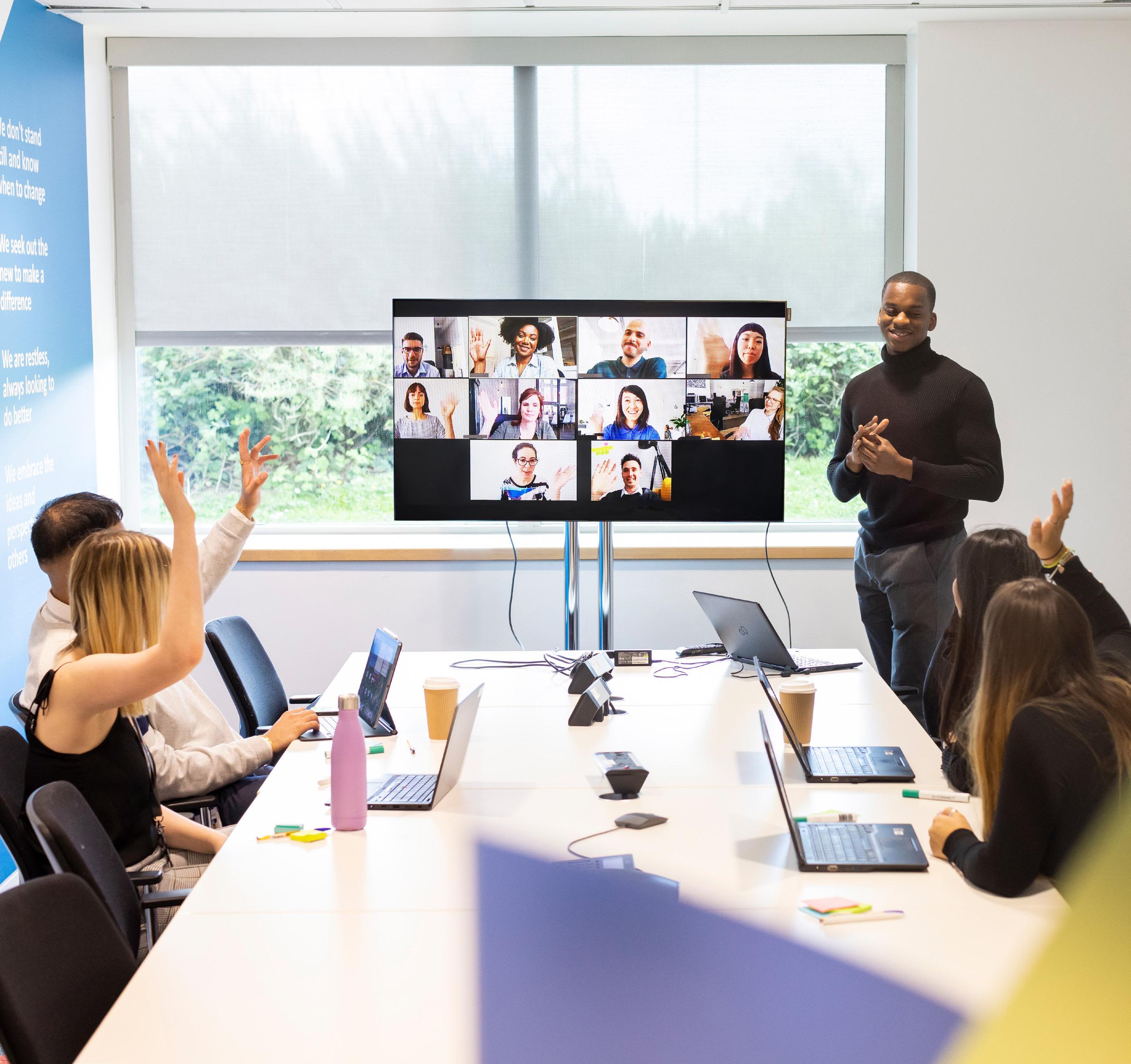
Every young person and adult deserves the choice of a high quality route in education, employment or training.
This involves direct action from businesses across the country - currently opportunities are spread evenly across the country however equality is not.
As a large employer in communities up and down the UK, Centrica’s recruitment policies and outreach programmes can open up opportunities for whole communities, changing trajectories of young people’s lives.
This includes Centrica’s industry-leading apprenticeship scheme which is delivering widespread opportunities for young people and indeed people of all ages; and open recruitment practices such as use of language, consideration of core capabilities in recruitment, working practices such as hybrid and a clear plan for the company’s people.
Apprenticeships are a key first step for many into rewarding careers, offering the opportunity to earn and learn.
Centrica’s People & Planet Plan focuses on long-term goals in areas that are most important to the company and where it can make the most difference. One of the key priorities within this plan is the recruitment of 3,500 apprentices by 2030 and provide career development opportunities within under-represented groups.
The apprenticeship programme allows Centrica to reach a very diverse workforce, working with those who want a career move, career change or were displaced due to Covid-19.
Apprenticeships are aimed at all ages and all minority groups with an aim of recruiting an even gender mix – despite 90 per cent of the engineering population being male.
The company took on 600 apprentices in the last year – a third of whom were female – who received a salary of £26,000 plus, with a van, tools, support, benefits and bonus. And Centrica will have hired 1000 apprentices by the end of 2022.
The majority of those have now finished their apprenticeship and provided comprehensive feedback.
In addition to its programme of apprenticeships, another key
pillar of Centrica’s upskilling for young people and people of all ages is through its award winning graduate programme.
Each year, Centrica attracts university leavers who are ready to innovate and pioneer new ways and methods in the energy and commodities sector; increasing the competitiveness of Centrica as a company, and increasing the talent in the overall sector that will help drive and innovate the country’s path to net zero.
But a career in Centrica is more than just opportunities directly in energy. The graduate scheme offers university leavers the opportunity to enter six different business areas. These include roles in business management, commercial analysts, commercial marketing, digital technology services & software engineering, UK Finance, as well as energy marketing & trading.
Centrica also places career progression at the centrepiece of its graduate programme, graduates can look to long-term careers and progress into management roles within the company and within its brands such as British Gas.
They will have the opportunity to learn from colleagues who are experts in their field, while always being encouraged to use their initiative.
Some of the graduate streams include an initial three-month placement specifically relevant to the role. This is followed by three further placements. The first will provide graduates with a foundation of how Centrica operates, and you will work with more experienced colleagues.
Upskilling the UK: Centrica’s Training Centres Centrica recognises that for people, knowledge and skills are power. As the demand for skilled workers is greater now than ever before, it is more important to help people upskill and achieve their potential too. This is a crucial pillar of the levelling up agenda and boosting social mobility across the UK.
Since 2003, Centrica have trained around 7,000 apprentices across their four academies in Dartford, Hamilton, Leicester and Thatcham.
The training academies deliver approximately 100,000 training days each year, which includes training hundreds of engineering apprentices on smart meter installation each year alongside upskilling their existing engineering workforce on courses such as the Service and Repair of Boilers.
Centrica’s City & Guilds accredited training centres equip people with skills across training, testing, compliance and design and installation. It includes a variety of courses including electrical courses, building controls and safety courses.
The centres are located across the UK, in areas such as Glasgow, Rotherham, Durham, Birmingham, Newbury, Tunbridge Wells; as well as the means to participate with virtual learning.
Not only is it essential to ensure there is training, employment and educational opportunities on offer - these opportunities must be open to all people, no matter their background.
This, in turn, benefits organisations, avoiding groupthink, and works to ensure the country as a whole is fulfilling its potential.
‘Applied’ is a hiring platform built using behavioural science that helps organisations hire the best candidate, free from bias.
Centrica has been using the tool for around two and a half years. Among other factors, it helps to identify and remove gender bias, masculine or aggressive language in job adverts.
Centrica measures internal and external applicants on their core capabilities, and whether they are required for the job they are applying for.
To do this it uses its own occupational psychologist tools, and then gives candidates feedback depending on the results. This allows them to improve their chances of being recruited.
Centrica offers the opportunity to all of its call centre staff to take advantage of hybrid working. This gives more people, who may live further afield, the opportunity to apply for work.

There is a level of flexibility provided, giving employees the choice of how to balance remote working with office-based working.

The plan includes three people goals and two planet goals. The people goals are:
Creating an engaged and inclusive team that reflects the diverse community the company serves by 2030.
Creating 3,500 apprenticeships by 2030 – particularly focusing on underrepresented groups and women. The aim is to recruit 50 per cent female apprentices by the end of 2022.
And to contribute 100,000 days of employee time to communities by 2030.
The nature of the challenges facing both people and planet are interlinked - one cannot be achieved without a continued focus on the other. Centrica is ensuring its ESG, purpose and levelling up strategy is joined up. Thereby, the planet goals are also relevant in its work towards Goal 5:
Becoming a net-zero organisation by 2045. Helping customers become net-zero by 2050.
Centrica has set out plans to recruit 500 ex service personnel - former soldiers, sailors and air force etc - into roles with British Gas and the wider group by 2023, to facilitate the transition to Net Zero.
Centrica partnered with Matero to help design and construct an extensive programme that attracts a significant number of veterans and ex service personnel, representing a best-inclass civilian career offering to the former forces’ community.

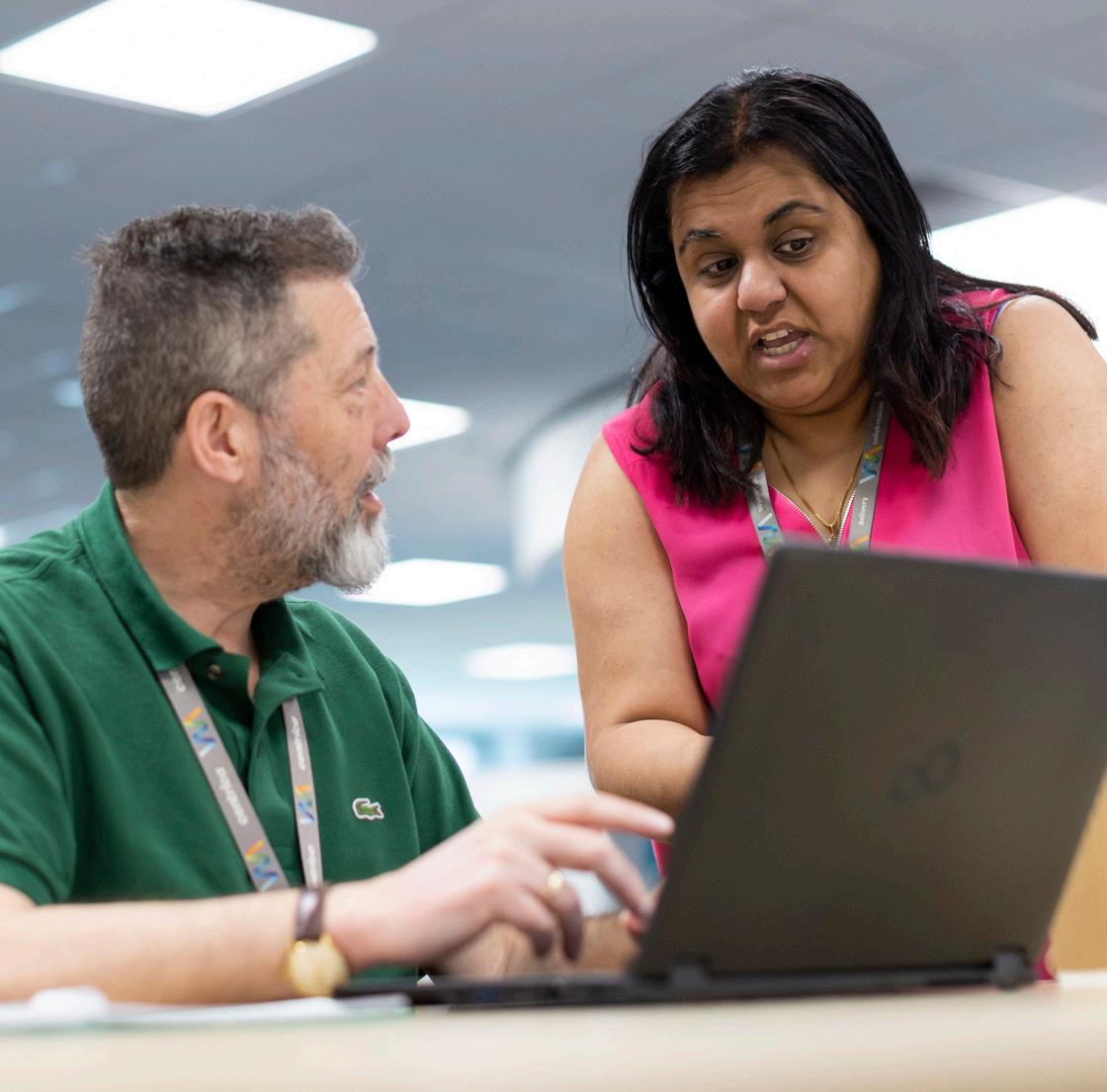
The first intake of 12 ex-service trainee gas engineers included Alex Smith, Wolverhampton, a former sniper with the 2 RIfles based in Northern Ireland.
Alex has begun his 42 week training course with Centrica after being medically discharged in 2013 as a result of being involved in two IED explosions during tours of Afghanistan. The two incidents damaged his hearing and eyesight.
After suffering from PTSD, Alex views the programme as a route back to normality - “I have always wanted a trade and this offer was amazing. It’s a skill to be proud of, which will give me stability in my working life to provide for my family and it opens up a lot of routes for progression into green energy.”
Chair of the Purpose Coalition, Rt Hon Justine Greening said of the initiative: “People and planet are two sides of the same coin. A purpose-led company puts both at the heart of everything they do. As a member of the Purpose Coalition, Centrica is demonstrating genuine advocacy as a business by taking the world’s priorities and making them its own. Its plans to recruit former servicemen and women and re-train them will help to build a workforce with the up to date skills that the country needs for a more high tech, greener economy. It has also recognised that the most successful businesses have the most inclusive workforces. Using all the talent that is available makes good business sense. It also ensures that opportunity is spread as widely as possible.”
The ex-forces scheme will be run in-house, following the Matero template, with the initial emphasis on recruiting and training gas engineers. Centrica is particularly keen to attract women into the programme, resulting in greater diversity within the organisations’ workforce.
The COVID-19 pandemic has shone a stark light on the health inequalities that exist and how they impact on wider life. A huge part of a person’s life is spent at work and therefore health and wellbeing can be significantly impacted by employers.
The nature of the cost of living crisis and the negative effects on financial, and in-turn, mental and physical wellbeing is vast.
Processes and initiatives in place to improve both the physical and mental health of employees are needed to ensure a healthy and happy organisation.
Centrica celebrates Mental Health Awareness Week as a way to get people to come back together and connect, combating isolation caused by the pandemic.
The initiative for May was #meetinmay to try and encourage connection – this can include meeting in person or putting a camera on during video meetings.
Centrica takes a holistic approach to health and wellbeing which focuses on thinking about the whole person and all the things that impact an individual.
This can include factors like mental, physical, social, community, finance, sleep and relaxation, nutrition and more.
Centrica aims to have a mental health inclusive culture across the organisation with a broad selection of support mechanisms.
Last year Centrica introduced its healthcare plan which is available to all employees regardless of level. There are 16,500 employees and 3,000 dependents who are enrolled in the plan.
Centrica provides private healthcare if the required treatment is not available on the NHS.
Part of Centrica’s holistic approach includes its MyCare programme - a confidential 24/7 psychological support service.
This service is available for all Centrica employees above the age of 16 and offers counsel over the phone or via live chat.
To support colleagues with their fertility treatment, Centrica offer paid fertility leave.
A Fertility Sanctuary discussion forum, an employee-led initiative created from volunteers, has been set up for Centrica colleagues with resources and video clips from members, a buddying scheme, and a network to share and gain support from.
Centrica has partnered with a 3rd party to give employees Free access to Fertifa, the one-stop 24/7 confidential fertility support that gives employees advice and discounts on the treatments that are right for them.
In 2021 Centrica introduced menopause guidance for all colleagues to raise awareness about the menopause transition and the considerations that should be giving within the workplace to employees.
They also provided colleagues with information about the additional support for colleagues in the menopause available through Centrica’s health and wellbeing channels.
In 2018, AXA Healthcare trained a team of more than 60 employees as mental health first aiders. There are now more than 100 mental health first aiders across the business.
Many of those applying brought their own personal experiences of managing mental health issues, and welcomed the opportunity to build new skills to help support their colleagues.
All line managers are enlisted on mental health leaders training –a three hour dedicated course to understand symptoms and early warning signs to allow them to recognise and signpost.
Centrica works with the mental health support charity Mind which provides advice and support to empower anyone experiencing a mental health problem.
MyHealth is a service to support Centrica’s employees in every aspect of their health, from sickness absence through to personal wellbeing.
This is achieved by using a multi-disciplinary team of case managers and experts such as physiotherapists, nurses, nutritionists and exercise therapists.
The team ensures that staff receive the right support and guidance from the most appropriate health and wellbeing expert at the right time.
In June, CCLA, an investment management firm for charities, religious organisations and the public sector, named Centrica as one of the top three of 100 of the UK’s largest companies, for its approach to workplace mental health.
Its score of 87 per cent, means it is leading the way on mental health management and disclosure.
In order to help customers to reach net-zero by 2050, four areas are being addressed – energy efficiency and optimisation, generating or storing clean energy, providing green energy and fuel switching.
The transition to a net-zero Britain is a unique opportunity to experience the creation of new careers and new roles but in the very places where they can make the most difference on spreading and equalising opportunity.
People and the planet are two vastly significant, interdependent priorities to any purpose-led businesses and to the levelling up agenda. Investment in the green economy is already bringing brand new opportunities to areas across the country; and it’s crucial that the transition is one that is equitable for people and communities everywhere.
As an energy provider Centrica has the opportunity to lead the way in the transition to net zero and the opportunities within the green economy that come with it.
The People and Planet Plan - Centrica’s long-term sustainability plan - focuses on long term goals in areas that are important to the company and its stakeholders and where it can make an active difference.
The five goals in the plan were launched in 2021 in line with the company’s new purpose – for its customers to live sustainably, simply and affordably.
Last October, Centrica published its first climate transition plan in the run up to the 2021 United Nations Climate Change Conference and was submitted for shareholder vote at its 2022 AGM.
It talks about the energy transition, Centrica’s role, its targets, governance, role of the board and the ‘just transition’.
The just transition seeks to ensure that the benefits of a green economy transition are shared widely, and those who might stand to lose financially are supported.
Centrica has two approaches in relation to the just transition –to minimise harm and to maximise benefit, and to ensure that no groups are left behind in the transition.

Four main stakeholder groups are impacted – customers, colleagues, communities and the supply chain.
When considering customers, ensuring the transition to a lower carbon energy future is affordable is a major concern, along with the broader responsibility to get the customer involved to understand their needs and concerns.
This means taking a progressive approach and advocating responsibly with the government and other organisations, developing propositions and services that are customer friendly and ensuring that vulnerable customers are protected.
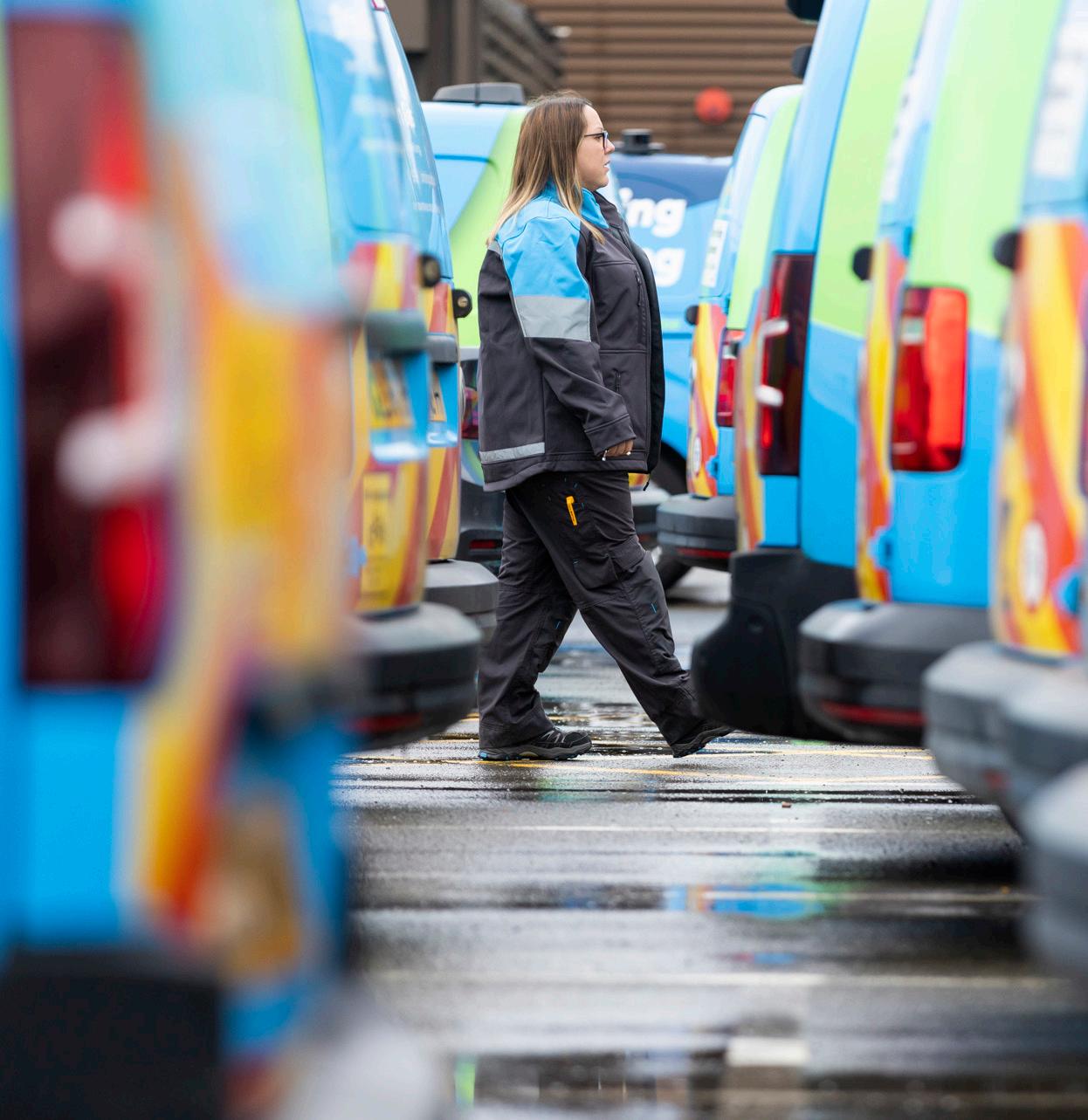
“Centrica’s plan is to provide new opportunities which will support the development of technologies that can help the communities to transition.”
When considering colleagues, there is a fundamental shift in skills needed to get Centrica and the country to net zero.
This means growing a greener and more inclusive team – the company is recruiting 3,500 British Gas engineers by 2030 –and supporting transition in current jobs through training.
When considering communities, local action and engagement is essential, as there are communities which are embedded – their livelihood is contingent on carbon intensive industries.
Centrica’s plan is to provide new opportunities which will support the development of technologies that can help the communities to transition.
For example, there are plans to convert the Rough offshore gas storage facility from methane to a clean hydrogen storage facility. The construction phase alone will support 3,000 to 4,000 jobs.
The Rough storage facility is already an extremely strategic asset for the UK as we move to becoming more energy independent. However, the potential to convert the facility to store hydrogen with investment from the government, in the long-term transition to net-zero, is a fantastic opportunity for the country and should be an area of focus moving forward.
The Rough storage facility is already an extremely strategic asset for the UK as we move to becoming more energy independent. This Winter Centrica has reopened the Rough Storage facility to provide gas storage for up to 30 billion cubic feet of gas, which has increased the UK’s energy storage by 50%. It will also boost energy resilience for UK homes and businesses over winter 2022/23
Centrica plans to become a net zero organisation by 2045, which is aligned with the Paris Agreement.
It categorises its three emission sources in three areas: Fleet - Centrica has the third largest road fleet in the UK, composed of British Gas engineers among others. It has been trialling electric vehicles for five years, and has committed to electrify the entire fleet by 2025.
Property – Centrica is decarbonising its estate quite heavily. It has reached 50 per cent to date and is planning another 50 per cent reduction by 2030.
Assets – Centrica owns and operates large scale assets including power generation, and gas production assets. It plans to convert some of these to play a role in supporting Net Zero such as producing or storing clean hydrogen and storing carbon. This will allow them to continue to provide greener jobs to the local community.
Centrica believe that hydrogen is a key component of the UK achieving its Net Zero ambition and will likely see the evolution of industrial clusters adopting hydrogen for industrial and power processes prior to the development of national hydrogen networks that could offer hydrogen in heating to UK homes and hard to electrify transportation.
Long duration energy storage could reduce net zero system costs by up to £24bn, with the biggest savings associated with the roll-out of large-scale hydrogen storage.1 Therefore, Centrica are looking at how their Rough gas field could be repurposed to store up to half of the UK’s expected hydrogen storage requirements.
Repurposing Rough would create over 2,000 jobs in the Humber during construction and a further enduring 350 direct jobs during operations, providing the UK with a vital part of energy system flexibility required in the future.
Centrica are part of the UK’s large-scale hydrogen village trials supporting both the gas distribution networks Cadent and NGN in this first-of-its-kind project.
They are working closely with Cadent in Whitby, Cheshire, to engage residents and businesses with the details of the project and the benefits of hydrogen. In August, they opened the Hydrogen Experience Centre in the town to showcase the hydrogen boilers, and cookers, they will be installing.
Gas central heating service, repair and installations company PH Jones is a member of the Centrica group and works closely with its clients.
It supports them to understand net zero, to bring the skills they need internally and deliver new technologies.
PH Jones offers a heat pump installation service, which captures heat from outside and moves it into the home, and other technologies such as solar which are paired and combined.

“Energy for Tomorrow is Centrica’s social impact fund, established in 2007 with a mission to help tackle climate change.”
A three-person team is needed to install the pumps –a qualified lead engineer and two plumbers. This brings people into the industry and gives them a clear and sustainable progression pathway.
In 2020, Centrica launched a hybrid heat pump trial in the West Midlands, targeting on-grid residential properties.
The trial was designed to test the premise that the technology could deliver up to 80 per cent of total heat demand from the heat pump, with 20 per cent coming from efficient gas boilers.
Centrica is sharing its findings with the government, in line with the new Boiler Upgrade Scheme – which provides grants to homeowners - and has just commissioned its first heat pump installation under the scheme.
It carried out the work with heat pump manufacturer Daikin and Hive smart thermostats – an energy and money saving device.
Last December, British Gas Energy Trust launched a £2 million Winter Fuel Fund to help its most financially vulnerable customers who are struggling to pay their bills this winter.
It was set up in response to the increasing cost of living and rising inflation, including Ofgem’s price cap increase of £139.
Through the fund thousands of British Gas customers with debts of £250 or more were provided with grants, to help pay towards their energy bills.
The fund has now increased by over £18 million this year to support those struggling with fuel debt, using 10% of British Gas profits. British Gas customers in fuel poverty and with less than £1,000 in savings are eligible to apply for a grant. Through the fund, thousands of British Gas customers have been provided with grants between £250 and £750 to help pay towards their energy bills
Energy for Tomorrow is Centrica’s social impact fund, established in 2007 with a mission to help tackle climate change.
Through financial support and advice, it empowers communities and entrepreneurs who have initiatives that can deliver affordable, accessible and sustainable energy solutions for all.
They may include reducing carbon emissions, changing societal and customer use of energy, and helping communities improve their energy management.
In 2011 British Gas installed solar panels onto the roofs of 268 schools, allowing them to reduce their energy bills by using the renewable electricity they generate.
Centrica maintains the panels through annual visits and carries out any remedial works required all free of charge for the schools.
The fund’s revenue comes from the feed in tariffs generated from the panels.
Its mission is to: Support projects that will change the way communities use energy and help the UK reach net zero.
Encourage collaborative action and empower communities with a vision for their future.
Help people understand their own energy use and the steps we can all take for a more sustainable future.
Some of the projects that the fund has supported are: Cornwall
The Cornwall project began in 2018 and ran until spring 2020.
Its aim was to reduce CO2 emissions through the implementation of a research and development programme and the deployment of new technology.
During the project, the team installed solar generation and/or storage units, as well as the very latest smart technologies, in 100 homes. All this hardware was free for the householders.
They also worked alongside businesses to provide energy audits and install energy monitoring and management equipment.
Together, these efforts created the Local Energy Marketa virtual marketplace for energy. This virtual marketplace enabled householders and businesses to buy and sell energy to the Grid.
They also had the opportunity to be paid for helping to balance the network and maximise the use of renewable energy, by either reducing or delaying their energy consumption.
In addition, the project developed an outreach programme for schools to engage students and demonstrate the benefits of renewable energy and the importance of balancing the energy grid.
A combination of lessons, careers fairs and STEM ambassadors reached almost 3,000 students.
The organisation has developed thermally insulating window shutters which consist of a shutter made from recyclable plastics and PVC, and a transparent polymer roller blind which sits behind to reduce heat and energy loss.
The clever design of the blind means that it insulates without restricting the flow of natural light into the room.
The founders of Flutter Shutter wanted to give back to their community and those living in social housing.
So, they set out on a mission to help them draught proof their homes and make them more energy efficient – without the cost of replacing windows.
Their initiative aims to reduce fuel poverty and carbon emissions, and with the help of Energy for Tomorrow they are now looking to partner with housing associations.
The aim is to make a real difference in homes across the UK and support communities in the transition to a more inclusive and sustainable future.
They are currently running a pilot for Liv Housing on five properties which has been well received by the tenants.
The project offers internal thermal imaging surveys which
identify heat loss and draughts, and signposts customers to low-cost energy efficiency measures.
Perfectly positioned to help create a more inclusive and sustainable future, the project is centred around the idea of ‘warmer homes, cooler planet’ and aims to tackle fuel poverty within communities and reduce carbon emissions.

A CHEESE thermal survey empowers people from all backgrounds to take targeted, cost-effective remedial action using powerful visual data.
It helps residents to identify and tackle causes of cold, draughty homes, which can lead to poor health, high bills, and climate change.
The project also provides free surveys to those in poor housing conditions and in fuel poverty. It is set to support a transition to net zero which is fair for all.
Brag Enterprise is a charity based in Fife offering employability advice and training and they’re upgrading their buildings with solar panels.
Their primary aim is to alleviate the effects of and then reduce poverty by providing job creation and re-training opportunities.
They currently have three buildings with office space and workshops for start-ups and entrepreneurs they support through their job creation schemes.
The charity wants to install 30KW of solar power to each to help reduce their operating costs and carbon footprint while allowing them to make the best use of their charitable funds.
They also want to set up an energy advice service for users of the food bank and pantry service based in their building.
Community Energy Scotland is carrying out a project in the Orkney Islands where it is monitoring heat pumps that are costing more than the old heating system.
The aim is to offer advice and support to islanders to help reduce their costs.
Decarbonisation of domestic heating systems to move closer to net zero, quantifying the CO2 savings, and showing that comfort is not sacrificed through moving to heat pumps.
Providing decarbonisation opportunities for those rural island households not able to access funding and not in receipt of benefits or a state pension.
Gathering evidence of a reduction in fuel bills enabled by heat monitoring data and cost analysis.
There is also an ambition to improve industry’s understanding of householders’ lived experience of heat pumps.
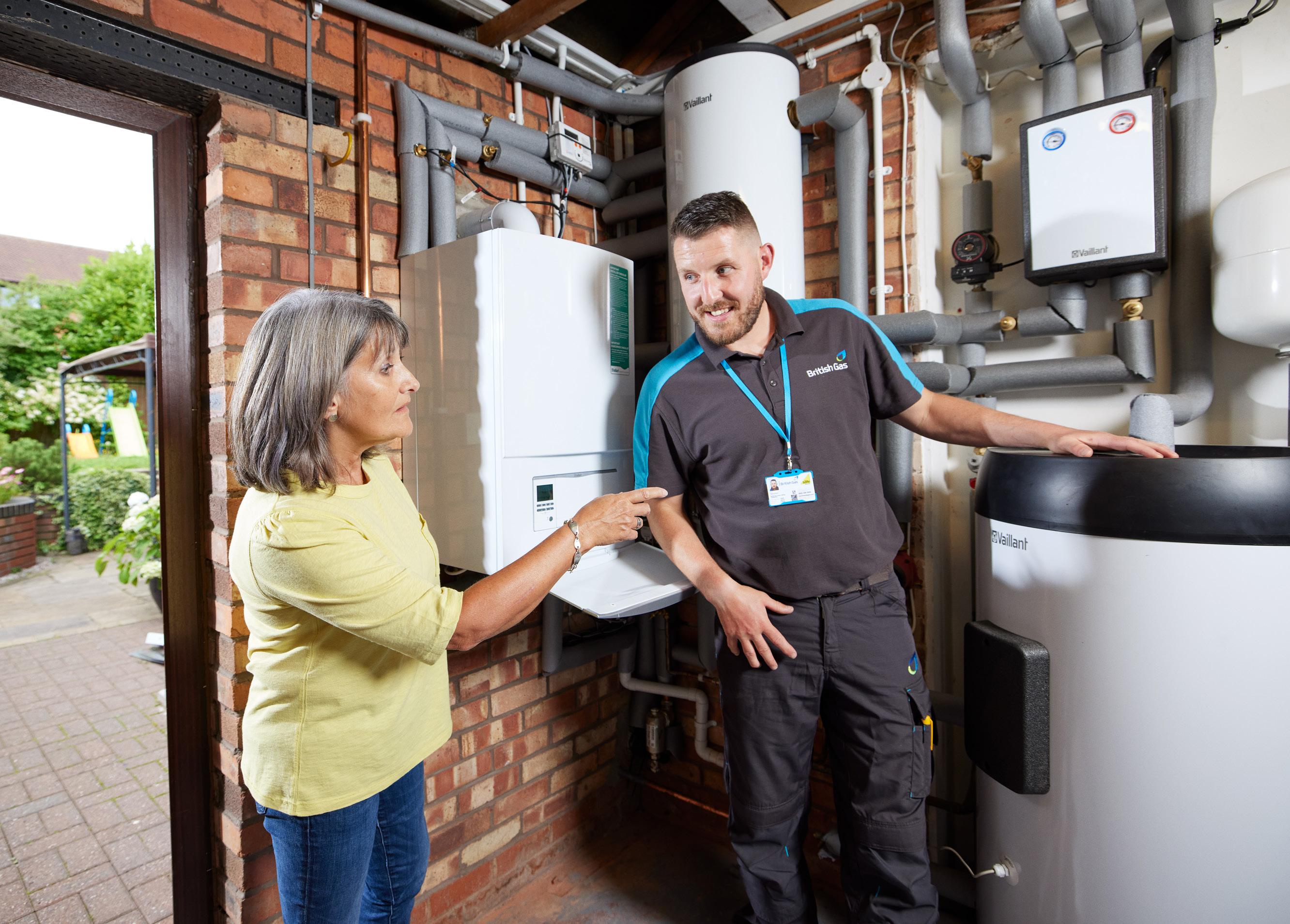
Energy Sparks is an online analysis tool to help schools reduce their carbon footprint.
It is a dashboard that shows their energy usage and gives tips and advice on how to reduce energy use and save money.
There is also a programme of activities for students who can get involved with helping the school save energy whilst also gaining life skills on sustainability and energy.
Energy for Tomorrow is supporting Energy Sparks with its ambitions to scale up into Scotland.
Eigg Trading is based on the Isle of Eigg and it is redeveloping its community hub to house facilities and services for both the islanders and tourists.
Energy for Tomorrow is supporting the company with funding which will allow them to install a biomass boiler and solar panels.
The community hub provides a space where islanders and tourists can co-exist and provides facilities such as laundry services which have not previously been available to some islanders.
ALIenergy, the local fuel poverty agency in Oban, West Highlands, is conducting a pilot to retrofit technology in 80 homes that will allow existing storage heaters to be charged at different times of the day.
About 95 per cent of the project participants only have access to tariffs that offer night-charging of storage heaters.
But the new technology allows heaters to be charged up to three times per day to improve comfort and eliminate the need for expensive supplementary heating.
The Forum for the Future project seeks to create a blueprint for engaging with communities and other stakeholders on the transition to net zero.
The model is based on a collaboration between community, businesses, public authorities and investors.
Its pilot scheme in Selby invites the community to be a part of something bigger, to work together to shape and achieve a fair and positive future where everybody has as much to gain as to give.

Centrica Business Solutions (CBS) targets public sector organisations to advise and assist in energy solutions projects.
In particular, this has included extensive decarbonisation projects with a number of NHS Trust’s and hospitals.
Over long term contracts CBS invests in infrastructure projects in large scale public sector organisations; upgrading energy centres, upgrading boilers and introducing zero carbon technologies such as solar panels and air source heat pumps.
These projects take essential organisation’s on decarbonisation journeys and provide a guarantee on how much energy the organisation is going to use. This will underwrite any savings for the organisation to invest back into the project or apply for a government grant - providing an estimated 20 year guarantee on how much energy it will use.
In the current climate this is a particularly beneficial scheme and sets essential public sector infrastructure up in the transition to net-zero.
CBS also carries out similar work with the private sector, focusing on industrial and corporate organisations in helping to reduce the cost of energy, in using less carbon, and assisting on their own renewable projects.
This would involve installing hydrogen boilers, heating systems and hobs - as part of a wider push to decarbonise the UK’s power through offering a more affordable alternative to help provide customers with a range of options to decarbonise their homes
Centrica Energy Assets Centrica Energy Assets (CEA) was established by CBS and has grown from around 20 team members to 60 as of writing. CEA seeks renewable, in particular solar and battery, asset investment opportunities across the UK.
CEA partners with land owners and directly invests in strategic sites such as Brigg in North Lincolnshire where Centrica recently announced plans to convert Brigg, a decommissioned Lincolnshire gas-fired power station into a battery storage facility capable of supplying the equivalent of a full day’s energy consumption for 11,000 households.
These sites are often in rural and deprived areas in which Centrica is seeking to build up relations and directly invest in land-owners while also supporting a transition to net-zero, inherently creating jobs in some areas through this investment.
This has included supporting farmers, a particular group of people hit hardest by the cost of living crisis, in diversifying their asset base through land rental - supplying an extremely valuable fixed income to vulnerable independent businesses.
As part of this investment campaign, CEA has also begun to plan community engagement and support schemes in these areas. CEA is planning to work with local schools and organisations in the community to ensure the local population is also benefiting along with the sites and land-owners who are the focus of the investment.
Centrica is particularly keen to attract women into the programme, resulting in greater diversity within the workforce.
Achieving equality through diversity and inclusion is important not just from a social perspective but also a business perspective. The research is clear that more diverse companies make better decisions because they have a wider perspective influenced by a broad spectrum of ideas.
Diversity extends beyond gender and ethnicity to sexuality, disability and other challenges that can lead to disadvantage. It is important that diversity is embedded throughout an organisation and is considered when making all decisions.
Centrica’s long-term sustainability plan focuses on long term goals in areas that are most important to the company and where it can make the most difference.
One of the People and Planet Plan’s five goals is to create an engaged and inclusive team that reflects the diverse community the company serves by 2030.
Another is to create 3,500 apprenticeships by 2030 – particularly focusing on underrepresented groups and women. The aim is to recruit 50 per cent female apprentices by the end of 2022.
Centrica has partnered with Matero Consulting, a start-up management consultancy which specialises in ensuring that military talent is best utilised.
Led by former Army Colonel Stuart Tootal, the external team has supported the company in recruiting more veterans, particularly those with relevant skills in engineering.
Together they are designing and building an in-house programme to attract service leavers and to represent a best-inclass civilian career offering to the former forces’ community.
It offers practical training, leading to good, secure careers which can really help to ease the transition back into civilian life.
So far over 100 veterans have been brought in across trainee and professional hire roles, with a target to hire 400 more veterans by the end of 2023 to make the UK’s first Net Zero Battalion.
Considering women representing just 12 percent of the armed forces, Centrica is planning to create a military spouses programme which will look at ways to encourage partners of military personnel to join the company.
Several roles are flexible in location and may suit those that are regularly travelling around the country.
The company is working with consultants and partners to see how the programme can progress.
In 2021, Centrica created a support network for the more than 400 self-declared veterans within the company.
It is the fastest growing and second largest diversity and inclusion network in Centrica, and allows employees to share challenges and problems such as PTSD with their peers.
The network can be accessed virtually, but focus is being given to the creation of regional chapters to allow for more face to face interaction.
In addition, more than 150 employees who are former armed forces personnel have signed up to a scheme in which they will mentor new veteran staff members.
People and Planet Plan
Centrica’s long-term sustainability plan focuses on long term goals in areas that are most important to the company and where it can make the most difference.
One of the People and Planet Plan’s five goals is to create an engaged and inclusive team that reflects the diverse community the company serves by 2030.
Another is to create 3,500 apprenticeships by 2030 – particularly focusing on underrepresented groups and women. The aim is to recruit 50 per cent female apprentices by the end of 2022.
Across the Centrica group there is an ambition that 50 per cent of those starting careers in Science, Technology, Engineering and Mathematics (STEM) roles are women.
The Energy Leaders’ Coalition is made up of 16 of the leading CEOs from the UK’s energy sector including Centrica.
Achieve equality, through diversity & inclusion

“The Carers’ Networka supportive group where people are able to connect with colleagues, carers or not, and share information and ideas about aspects of caring.”
They have made a public declaration to improve gender diversity in their companies and in the sector as a whole.
Through the coalition, the company has aligned itself with the Powerful Women initiative which seeks to promote the growth and leadership development of women across the energy sector.
Its goals are to see 30 percent of executive board roles and 40 percent of middle management roles filled by women by 2030.
Last year, Centrica built its first diversity and inclusion dashboard which looks at policy checks across the business and business units, and creates a starting point and a pathway.
This means that the company creates a culture of diversity and inclusion for new employees to come into.
Centrica has several employee networks:
The Carers’ Network - a supportive group where people are able to connect with colleagues, carers or not, and share information and ideas about aspects of caring. Its purpose is to provide support to employees with, or those affected by caring responsibilities. Centrica employees also have access to up to six weeks additional Carers Leave which is explained in its Carers Policy.
Spectrum - Centrica’s LGBTQI+ employee network. It’s purpose is to make it easier for everyone to bring ‘their whole selves to work’, regardless of sexual orientation or gender identity. The Spectrum Network and its events are open to everyone, whether you identify as LGBTQI+ yourself, or you just want to find out more about how employees can support their LGBTQI+ colleagues as an ally. Centrica recognises that a person’s sexual orientation and gender are important parts of their identity and being able to bring your whole self to work is central to being a confident, motivated and productive employee.
DAWN - Centrica’s Disability and Wellbeing Network. It works to help disabled employees thrive at work. Its vision is for Centrica to be a Disability Confident leading company and employer of choice, where people with any form of disability feel supported. The network is for everyone, whether one considers themselves to have a disability, or an employee simply wants to find out more about how they can support their colleagues.
Centrica Women’s Network - a support network open to all employees at Centrica, no matter the level or gender. Its purpose is to be a catalyst for change. Through enabling and empowering women to meet their full potential in the workplace, Centrica’s vision is to ensure the organisation is a great place for women to work. It recognises that by having a more inclusive workforce, and by
embracing the diversity of ideas and experience in the organisation, it will make a more successful business and place of work.
BOLD - Centrica’s Black Employee Network. Based in North America, the focus of the network is to support the creation of a diverse environment where the Black community feel both well represented, and supported. The network provides a platform to identify issues, educate the broader Centrica employee community and therefore increase awareness and inclusion.
Honour Network - also based in North America, seeks to support Centrica employees who are US veterans and military members, as well as their families, friends and supporters. Through this, the network attempts to identify new and existing opportunities to demonstrate appreciation for this community.
Ethnicity Network - is open to all employees at Centrica. Its purpose is to build a working culture that values diversity and where the best talent can succeed, irrespective of ethnicity or background. The network provides a place for members to share their own challenges, experiences and ideas, while feeling supported by active allies. Centrica recognises that by having a more inclusive workforce, and by embracing a diversity of ideas, it is able to think differently as an organisation. Thus, are able to take the business forward in the best possible direction.
The Fertility Group - its aim is to help colleagues grow families as well as their careers by offering a support network open to all genders, for anyone working at, with or for Centrica. With working groups in the UK and North America - but available in all regionsthe network offers ‘Fertility Buddies’, useful resources and general advice. Centrica acknowledges that it can be a real challenge to achieve family dreams, so the group is there to give one reassurance that colleagues understand what one may be going through and will do everything in its power to make Centrica an employer of choice when it comes to raising a family while at work.
The Menopause Group - is a sub group formed, from the Centrica Women’s Network Group. Its mantra is “Making menopause matter in the workplace – supporting women and men to be open to share and discuss what is often a taboo subject”. The group was set up to create a safe place and a supporting sounding board to help women through the challenges the menopause often brings. Its purpose is to help Centrica employees, both women and men, discuss this openly and in a safe environment, to make them feel less alone and more informed of the myriad of challenges this could bring. The network also works to empower and support women to see the menopause as an exciting next phase of their lives, discussing all the advantages and excitement this next stage can be.
These are safe spaces where employees can share their experiences and talk about ways to improve their working life through new policies.
When compared against the framework of the Purpose Goals, Centrica’s current impact is evident, and the potential areas warranting further focus are identified. Centrica delivers on the Purpose Goals through a commitment to its People and Planet pledge, pinpointing Goal 5, Goal 8, Goal 13, and Goal 14 as central to its purpose.
As an organisation in the United Kingdom of over 7,000 engineers and technicians, Centrica’s concentration on an inclusive, diverse, and supportive employee journey is impacting many.
It offers an extensive apprenticeship programme, welcoming over 900 new apprentices since January 2021. Centrica also plans to broaden the schemes’ reachpledging 3,500 new apprenticeships by 2030, particularly focusing on underrepresented groups and women.
This purpose-led focus to employee recruitment is sustained throughout Centrica’s internal staff support programme. Centrica takes a holistic approach to employee health and wellbeing, with various schemes underpinning its overarching support network - MyHealth.
Centrica’s vision for a supportive and understanding employee journey is upheld by the MyHealth scheme. With a team of multi-disciplinary case managers and experts - the access to professional guidance and specialised advice for all employees successfully meets Goal 8 of the Purpose Goals.
The company is also seeking to pool its resources in areas where equality of opportunity can be achieved for all. Centrica is a member of the Energy Leaders Coalition,
aligning itself with the coalition’s ‘Powerful Women’ initiative - committing to 30 percent of executive board roles and 40 percent of middle management roles to be filled by women by 2030.
Centrica’s open, inclusive, supportive and diverse employee journey delivers on its purpose agenda and three of the Purpose Goals. This contemporary approach is beneficial for all parties, and a recognition of this helps the business build on this work and for the future.
Crucially, Centrica has committed to a set of steps towards becoming a net-zero organisation and truly harnessing the energy transition to the benefit of the wider community and future generations.
These benchmarks include, becoming net-zero 2045, helping customers become net-zero by 2050, materially decarbonising its estates by 2030, and in the short term to electrify its entire fleet of vehicles by 2025.
Centrica acknowledges its responsibility to lead the shift towards a greener energy sector and by setting out a clear and transparent planet pledge it is driving purpose focused change. This is no better illustrated than by the business’ ‘Green Skills’ campaign - driving 3,500 apprenticeships in installing and maintaining carbon-efficient technologies. Directly harnessing the energy transition.
The continuation of these commitments by Centrica will ensure that it can be central to the changing scope of big business, reaching its potential as a force for good and a champion of social change.
Centrica is an illustration of the way in which a large scale organisation can affect change for employees and its wider community, while building for a lower carbon future.

“As an organisation in the United Kingdom of over 7,000 engineers and technicians, Centrica’s concentration on an inclusive, diverse, and supportive employee journey is impacting many.”
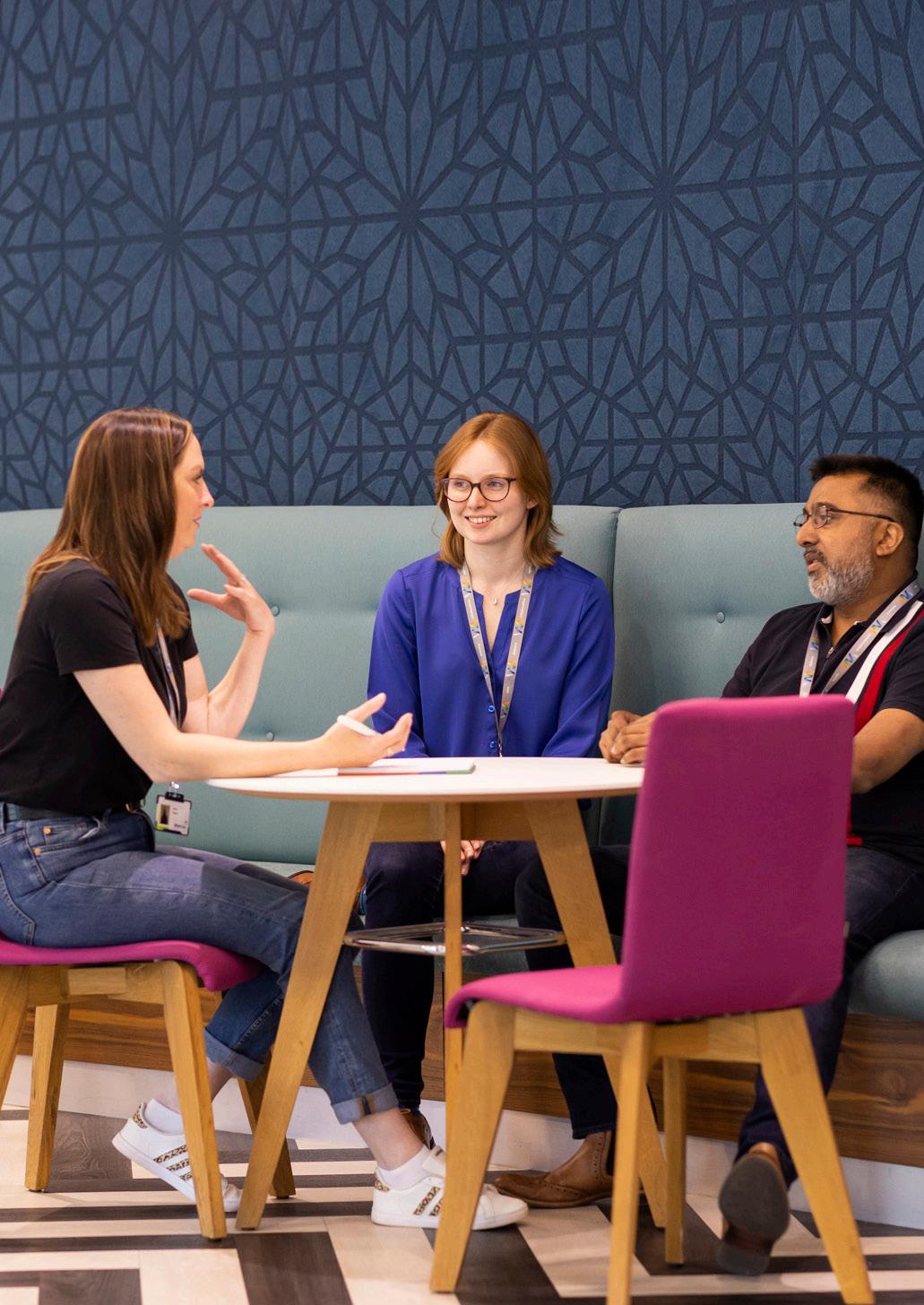
This Levelling Up Report shows clearly that Centrica is delivering a significant social impact across the UK and levelling up, while helping the country achieve its net zero ambitions at the same time. Centrica is ambitious about how it furthers its commitment to levelling up and how the positive impact it has can be scaled even further. It has worked with the Purpose Coalition to set out recommendations on where it takes its delivery of a positive social impact next.
6.1. Targeting community impact towards the most deprived areas
Centrica can have a more significant impact on levelling up by targeting its community efforts.
Centrica should assess how its social impact and programmes can focus on the most deprived areas around its key sites - including around areas such as Salford and Glasgow where the company has a large presence.
This might include tilting its apprenticeships and similar opportunities towards local social mobility cold spots, which will enable the company to deliver the greatest impact for the local communities and people that need it most. It can use the Office for National Statistics’ Index for Multiple Deprivation to enable this. This includes widely-used datasets within the UK to classify the relative deprivation (essentially a measure of poverty) of small areas. It considers how all areas across the
country (32, 844 areas in total) rank in terms of deprivation by income, employment, education, health, crime, living environment, and barriers to housing & services.
This will both enhance and drive forward the impact of Centrica on the levelling up agenda in a way that also delivers operationally for the business.
6.2. Thought Leadership and Advocacy Centrica has considerable expertise that can help shape the wider levelling up agenda with key stakeholders, including both government and industry.
As a purpose-led business that has produced its own report on levelling up, Centrica is a company that is positioned to lead by example.
Centrica should use its expertise and positioning in the energy sector to be a firm and clear advocate for responsible business and business-led levelling up. Through effectively using its relationships with key stakeholders and supply chains, Centrica can leverage its own efforts on social impact and create a significantly greater impact for local people and communities.
6.3.
Centrica should build on their existing measurement and reporting on socio-economic diversity. Measuring the socio-economic background of all employees, potential recruits and customers, would help not only Centrica but the wider Purpose Coalition’s understanding of what exactly needs to be done to improve socio-economic diversity and identify challenges among people with less privileged backgrounds.
“As a purpose-led business that has produced its own report on levelling up, Centrica is a company that is positioned to lead by example.”